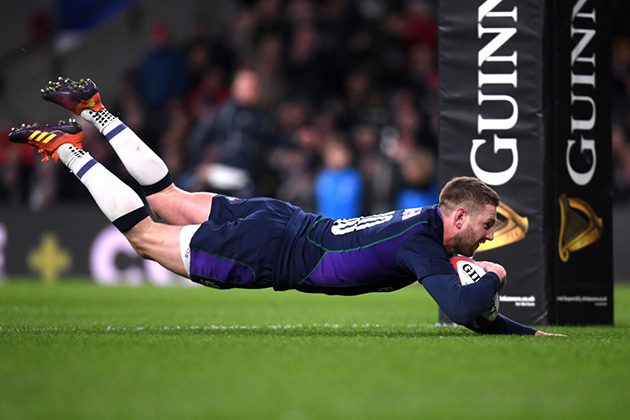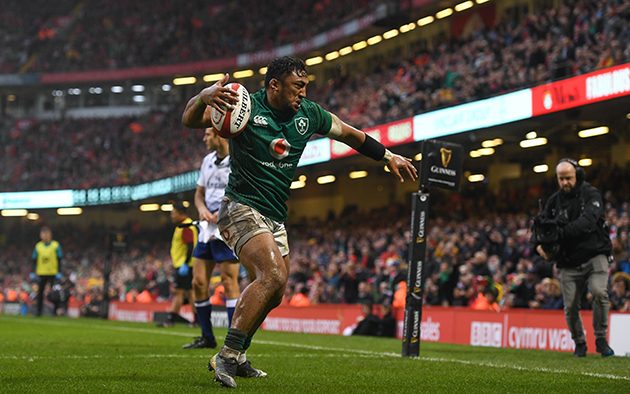After a Super Saturday that lived up to the billing, we reflect on the final goings-on in the 2019 championship
Did Ireland peak too early for the 2019 World Cup?
It’s only four months since Ireland beat New Zealand in Dublin, yet so much has changed in that time.
Back in November, a 16-9 victory over the All Blacks put Ireland firmly in the frame for the World Cup. Steve Hansen described the men in green as the best team in the world, Joe Schmidt was named World Rugby Coach of the Year and Johnny Sexton took the player gong.
Talk didn’t just centre on Ireland going beyond the World Cup quarter-finals for the first time but of them being one of the favourites to lift the Webb Ellis Cup.
Now they almost look a shadow of their former selves. Beaten by England in round one and Wales in round five, they finished third in the Six Nations table that they had sat atop of 12 months previously.

Busy man: Ireland coach Joe Schmidt has work to do before the World Cup (Getty Images)
One Irish journalist in Cardiff described Ireland’s performance in the 25-7 defeat by Wales as the worst of the Schmidt era.
Yes, they have had a number of injuries to deal with throughout the campaign, but the way their clinical, controlled game has fractured will be a major worry for the back-room team. The creative, innovative set plays Schmidt is known for were also notable by their absence.
As well as hitting upon the best tactical game plan for the World Cup, the coaches also need to rebuild confidence. Otherwise that wait for a semi-final will go on for Ireland. After all, they are likely to face either New Zealand or South Africa in the last eight.
Wales fly-half Gareth Anscombe wins over critics
Gareth Anscombe could hardly be described as ‘Mr Popular’ since arriving in Wales in 2014.
Listen to the teams being read out before a Test at the Principality Stadium and the cheers that follow his name are undoubtedly more muted than for others, particularly his fly-half rival Dan Biggar.
In the England match, when Biggar replaced Anscombe, the applause for the new man reverberated around the stadium.

He can kick it: Gareth Anscombe chips ahead to set up Hadleigh Parkes’s try (Getty Images)
Yet in the Grand Slam decider he will surely have won over at least some of his critics. For a start there was the clever chip off the outside of his boot that delivered the ball into the grateful arms of Hadleigh Parkes for a try after just 70 seconds.
Then there was his flawless contribution from the tee, slotting 20 points as Wales wrapped up the Grand Slam in style.
The debate over who should play fly-half at the World Cup will go on – it will probably still be happening once the final whistle has blown at RWC 2019! – but Anscombe has shown his talents at Test level at ten and 15 in this Six Nations.
England show mental frailty yet again
England were 31-0 up against Scotland at Twickenham before needing to convert a try with the final play to scrape a 38-38 draw.
Related: England and Scotland draw in closer
It’s not the first time England have blown a big lead and Eddie Jones believes the team’s mental frailties come from their early exit at the last World Cup.

Mental block? Owen Farrell and his England team-mates look downbeat during the draw with Scotland (Getty Images)
“Whenever you have a difficult tournament or difficult games, there’s always a lingering thought process there. Sometimes it takes you longer than you’d like to fix, but it is fixable,” said Jones.
“It comes in when you get under pressure, a lot of pressure, and you can’t work out a way to get back to what you want to do.”
It’s an interesting take from Jones given there are so many new faces in his squad compared to 2015, but if it is an issue that needs to be fixed, it needs to be fixed fast because pressure will only increase come the World Cup – and they don’t have a straightforward group with Argentina and France also in Pool C.
Scotland need to deliver 80-minute performances
Gregor Townsend endured an injury list longer than the proposed Brexit withdrawal agreement, so to come within a minute of ending the 23-year wait for a Calcutta Cup win at Twickenham was impressive.

Bright spark: Finn Russell dives over for a try at Twickenham (Getty Images)
It was a quite spectacular Test match between England and Scotland, one that would have drawn in even non-rugby fans such was its unpredictable nature. Yet what could have happened if the Scots had played from the first minute rather than the 40th?
It was a similar story against Wales the week before, whereas against Ireland, the Scots did well in the first half and dropped off in the second.
If Townsend’s team can start putting together 80-minute performances, opponents will find it hard to live with the pace and freneticism of their game – and they could be the surprise package at Japan 2019.
Will France change their coach?
But for a post deflection and a couple of knock-ons, Italy would have beaten France in Rome. Instead, the French squeaked a win.
Fourth place in the table probably flatters this current France squad and the number of basic errors would embarrass a vets’ XV let alone an international side.
It may sound ageist, but does 65-year-old Jacques Brunel have the ability to produce a game plan that can succeed in the modern game? It certainly doesn’t look like it at the moment.
Packed edition of the #Midol today with lots of info on the French coaching staff in the short and longer term.
Sounds increasingly like Fabien Galthié will be part of the staff in Japan.
And Bernard Laporte is eyeing up some big foreign coaches for 2023. pic.twitter.com/ROeiYnIbqi
— Paul Eddison (@pauleddison) March 18, 2019
Former France scrum-half Fabien Galthié is apparently being lined up to come into the back-room team for the World Cup, as are a couple of others, but will that be enough, particularly if Brunel is still the head man?
France have tended to perform well at World Cups but there is a growing possibility that the 2023 hosts will not make it out of their pool for the first time in 2019.
Not such a helping hand for Italy…
We’ve often seen post protectors help players score tries, touching down alongside the base as they know that counts as the line, but – as mentioned above – the opposite was true for Italy on Saturday.
Tommaso Allan puts in a grubber behind the French defence, Marco Zanon chases hard, the ball bounces off the post and over his shoulder rather than into his arms.
Oh how things could have been different if that ball had fallen into his hands. Instead, it’s another wooden spoon for Italy.
Follow Rugby World on Facebook, Twitter and Instagram.





